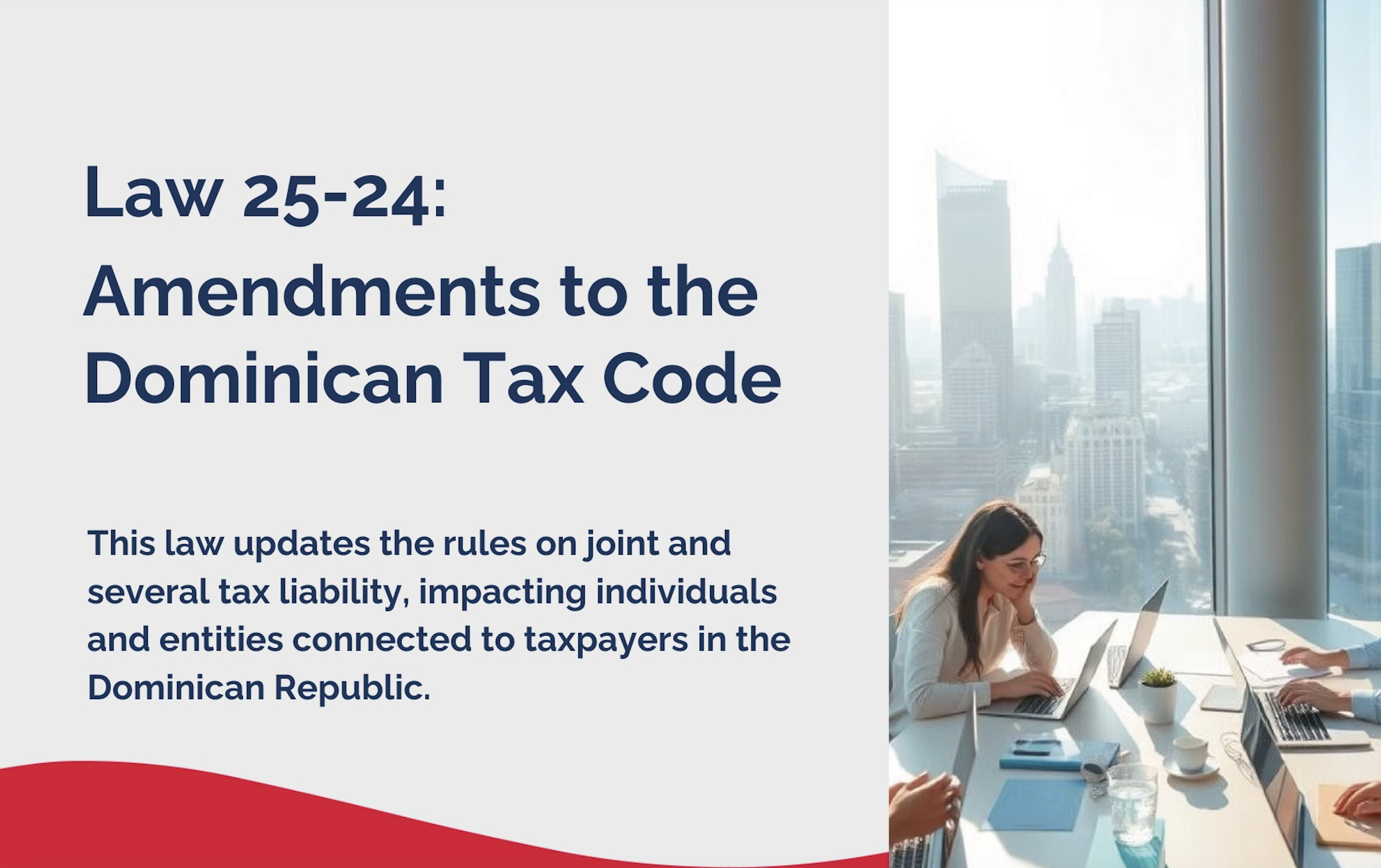
Ley 25-24: Modificaciones al Código Tributario Dominicano
Introduction
On April 30, 2024, Law 25-24 was enacted, amending Article 11 of Law No. 11-92, which establishes the Tax Code of our country. This legislation aims to update the rules governing joint and several tax liability for individuals and entities directly or indirectly linked to legal or natural persons subject to taxation in the Dominican Republic.
This legislative amendment introduces various implications, impacting not only those directly involved in taxation but also those maintaining ties with taxpayer entities. Below, we will help you understand how this modification will affect your tax responsibilities and the steps you should take to ensure compliance with your fiscal obligations.
What Does This Amendment Include?
The main changes introduced by Law 25-24 to Article 11 of the Tax Code are outlined as follows:
1. Expansion of Joint and Liability
2. New Rules for Joint and Liability
3. Joint and Liability Due to Economic Connection
1. Expansion of Joint and Liability
Joint and several liability refers to individuals who are liable for their assets alongside taxpayers, based on specific conditions defined by law.
Previously, the Tax Code provided a simple list of those jointly liable for tax obligations. With the enactment of the new law, the list of liable parties and their rules have been expanded. Moving forward, the following parties will be jointly liable for tax obligations:
– Parents, guardians, and legal representatives of incapacitated individuals.
– Agents managing assets.
– Trustees, liquidators, and representatives of bankruptcy, insolvency, and liquidation proceedings.
– Partners of partnerships or informal partnerships in cases of liquidation or dissolution.
– Individuals and officials responsible for ensuring or verifying compliance with tax obligations who fail to do so.
– Withholding or collection agents.
– Third parties facilitating tax evasion due to negligence or fault.
– Legal entities resulting from mergers or transformations, regarding taxes owed by the merged or transformed entity.
– Purchasers of assets or businesses, are liable for the tax debts of acquired companies unless the notification deadlines have been met.
– Representatives, executives, partners, and shareholders of legal entities or entities without legal personality, liable for tax debt due to negligence or failure to comply with tax duties.
2. New Rules for Joint and Liability
The law introduces a significant change, stating that joint and several liability for tax obligations is *legal* and not *declarative*. This means that it is unnecessary for such liability to be recorded in the registry of the Dirección General de Impuestos Internos (DGII) to affirm its existence. For an individual to be jointly liable for a tax obligation, it is sufficient to verify compliance with any of the conditions or qualities outlined above.
3. Joint and Several Liability Due to Economic Connection
The law further provides that economic or legal ties between different entities may be considered a single economic unit. If one party evades tax obligations, both may be jointly liable for the tax debt.
Conclusion
Following the enactment of Law 25-24, the Dirección General de Impuestos Internos (DGII) issued an informational notice on October 25, 2024, requiring all legal entities to designate a physical person responsible for ensuring compliance with the entity’s tax obligations. This individual must be appointed via a duly registered resolution of the entity’s assembly or equivalent body before the Chamber of Commerce and Production or the corresponding regulatory authority.
The DGII has granted a deadline until the next Ordinary General Assembly to make this decision and notify the designated person. Failure to do so will result in the automatic appointment of one of the physical persons listed in the company’s records, such as a manager, administrator, or the individual holding the largest share in the company.
At ALBURQUERQUE, our Corporate Business and Investment Department is ready to assist you with drafting the Assembly Resolution, registering it with the corresponding Chamber of Commerce and Production, and filing it with the DGII.
Contact us for more information and ensure timely compliance with your tax obligations.